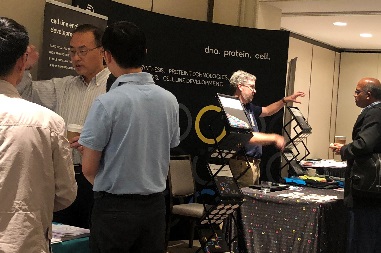2019 Programs
Keynote Speakers

H. Kaspar Binz, PhD
CEO & Founder, Binz Biotech Consulting

Soldano Ferrone, MD, PhD
Professor in Residence, Surgical Oncology, Surgery, Massachusetts General Hospital, Harvard Medical School

Maria Karasarides, PhD
Executive Director, ImmunoOncology, Regeneron Pharmaceuticals

Wen Jin Wu, MD, PhD
Senior Investigator, Office of Biotechnology Products, Center for Drug Evaluation and Research, FDA CDER
Highlights from the 2nd Annual Bispecific Antibody Pipeline Congress “Paving the way to Clinical Success”
August 20-22, 2019 – Washington D.C., USA
Jeffrey V. Leyton, PhD, Associate Professor, Sherbrooke Pharmacology Institute, Sherbrooke University, Canada
From August 20-22, Washington D.C. was the place to learn about the latest cutting-edge bispecific antibody (BsAb) science. The 2nd Annual Bispecific Antibody Pipeline Congress brought together more than 100 researchers and featured 32 podium
presentations, covering current and emerging topics of BsAbs. Presentations and attendees at this meeting represented scientists from throughout the United States and several other countries including Canada, Switzerland, Germany, the Netherlands,
Brazil, China, Japan, and Korea. There was more than five hours for meaningful networking either over refreshment, poster sessions, or informal problem-solving breakout discussions. As a leading forum for the latest advancement in BsAb research, the
Bispecific Antibody Pipeline Congress set an important standard for the BsAb community in a very friendly, casual setting that encourages discussions, questions and conversations among attendees.

Highlights
Four major themes emerged from the congress and were:
BsAbs giving new life to checkpoint inhibitor immunotherapy. It has been less than a decade since the first checkpoint inhibitor monoclonal antibody (mAb) ipilimumab was approved for the treatment of CTLA-4-positive melanoma. Since then
there has been an explosion in the development of checkpoint inhibitor mAbs, with an additional six new approved mAbs all against PD-1/PD-L1 and several more undergoing clinical evaluations. The good news is if you are a patient who responds to checkpoint
inhibitor therapy, you have a great chance of achieving long-lasting disease-free survival. The bad news is checkpoint inhibitor mAbs are only effective in a narrow spectrum of tumor types, predominantly melanoma and non-small cell lung cancer. Moreover,
within these cancers only a proportion of patients respond. Scientists presented BsAbs designed to simultaneously bind CTLA-4 and PD-1 or PD-1, PD-L1, or CTLA-4 and T-cells. The latter design specifically combines checkpoint inhibition and T-cell
activation. These BsAbs showed very encouraging results for eradicating tumors.
T-cell engager BsAbs. This direct approach is for BsAbs to recruit T-cells and activate them in close proximity to tumor cells. CD123 taregting BsAbs were well represented. CD123 is a highly sought after target as it is highly expressed
on acute myeloid leukemia cells but not on healthy hematopoietic cells. CD123 is also a marker for the notorious leukemic stem cell population. Many monospecific antibodies have failed in the clinic because simply binding CD123 has been insufficient
to stimulate an anti-tumor response. Numerous strategies were presented to simultaneously target CD123 and the T-cell receptor CD3, and arein clinical trial.
Safety concerns for BsAbs. Cytokine release syndrome has arisen now with the creation of biopharmaceuticals designed to activate the immune system and is a major concern for BsAb developers. We had several presentations on strategies
to mitigate cytokine release syndrome. Presentations included innovative methods to develop anti-CD3 antibodies with varying levels of T-cell activation and pretreatment designed to eradicate peripheral tumor cells to limit T-cell activation at non-tumor
sites. Additional presentations were from the US Food and Drug Administration that provided excellent guidelines during BsAb development to ensure safety is measured properly and improve clinical trial design.
Next-generation BsAbs. BsAbs are rapidly evolving in design and extending into novel applications. A BsAb was presented that is effective against an infectious pathogen. Biparatopic BsAbs were being developed to improve T-cell activation
and to be developed as highly effective antibody-drug conjugates. The development of BsAbs that exploit the TGF-b pathway and tumor angiogenesis are demonstrating remarkable abilities to effectively eradicate tumors in patients.
 Future. In general, the BsAbs presented have made tremendous strides and are currently undergoing early clinical phase studies. The
next steps will be to determine whether BsAbs will be able to provide long-lasting disease-free survival especially in patients who do not respond to checkpoint inhibitor therapy. Lastly, fundamental questions remain that must be answered. Do BsAbs
pull effector immune cells into the tumor or, rather do BsAbs activate dormant immune cells already present in the tumor? Thus, next year’s Bispecific Antibody Pipeline Congress anticipates presentations on late clinical trials and increased
fundamental research to elucidate biologic underpinnings necessary to further generate novel BsAbs and treatment applications.
Future. In general, the BsAbs presented have made tremendous strides and are currently undergoing early clinical phase studies. The
next steps will be to determine whether BsAbs will be able to provide long-lasting disease-free survival especially in patients who do not respond to checkpoint inhibitor therapy. Lastly, fundamental questions remain that must be answered. Do BsAbs
pull effector immune cells into the tumor or, rather do BsAbs activate dormant immune cells already present in the tumor? Thus, next year’s Bispecific Antibody Pipeline Congress anticipates presentations on late clinical trials and increased
fundamental research to elucidate biologic underpinnings necessary to further generate novel BsAbs and treatment applications.